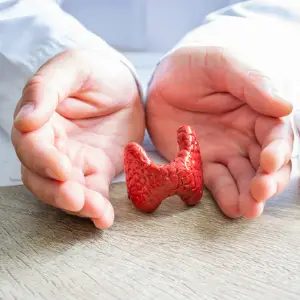By Dr. William Epperly of Forum Health Bloomingdale
You’re tired all the time, gaining weight, constipated, losing your hair, can’t think straight, and feeling depressed. You wonder if maybe you have a thyroid problem because you have heard that thyroid hormone has something to do with your metabolism and energy. So you go to a doctor, he runs some tests and then tells you that all your numbers “look good” and suggests that you may be depressed. You leave with a prescription for Zoloft or Prozac or Lexapro. Now what?
The problem is that the numbers don’t always tell the whole story when it comes to diagnosing a thyroid hormone problem.
The problem is that the numbers don’t always tell the whole story when it comes to diagnosing a thyroid hormone problem. These days there is division amongst doctors about how to diagnose thyroid illness. The vast majority still use an elevated TSH as the gold standard for diagnosing hypothyroidism, and if the TSH falls between .45 and 4.5, you are considered “normal”, end of story usually.
But Dr. Ken Blanchard, an endocrinologist and thyroid expert near Boston, says that the idea that a normal TSH rule out hypothyroidism “is the biggest single mistake in the entire history of medicine”. Furthermore, the new normal range has been lowered to .3-3.0, but most labs and doctors are still using the old range which means that with a TSH of 4, you may be told you are “normal” even though your TSH is actually high. Plus, .3 to 3.0 is actually a pretty broad range as it is a logarithmic scale relative to T4 levels (levothyroxine).
Dr. Blanchard and I, as well as many other doctors all believe that we have to listen to the patient and the symptoms they are having, measure more than just a TSH, and then, when it’s appropriate, be willing to prescribe a trial of a low dose thyroid hormone replacement (with Levoxyl or Armour or Nature-Throid or Westhroid) to see if there is a benefit.
Patients are given a full description of what signs or symptoms to watch for that would indicate thyroid overdosage, which includes palpitations and a rise in resting pulse more than ten beats per minute.
Patients may benefit from thyroid hormone supplementation even with normal labs because they may have some thyroid hormone resistance in a similar way that so many people have insulin resistance. Or they may have impaired T4 to T3 conversion. Neither of these conditions is detectable by lab tests.
Additional labs that should also be done in many cases are free T4, free T3, and anti-TPO antibodies. In some cases, we also measure anti-thyroglobulin antibodies, total T3, and the reverse T3 (so we can calculate the TT3:RT3 ratio which can be yet another clinically important number).
After making any changes in thyroid replacement dose, one should wait about six weeks before rechecking labs and the blood should be drawn ½ way between doses, i.e. 12 hours post-dose.
Finally, it is always important to keep in mind that even though thyroid hormone has far-reaching effects, not all symptoms including fatigue and weight gain, are due to low thyroid hormone function. There are many reasons people are tired and cannot lose weight and a thorough evaluation is always a good idea.
For additional information on thyroid conditions, click here.
If you feel like you may have a thyroid imbalance, contact us to schedule your 15 minute health advisor call.






